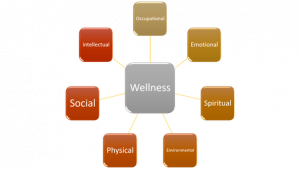Healthy Living is about making healthy choices every day. It is more than simple habits, it is a lifestyle. A lifelong commitment to consciously making healthy choices that contribute to the quality of life.
According to the World Health Organization, Health is defined as a state of complete physical, mental and social well-being and not merely the absence of disease.
The individual’s characteristics and lifestyle behaviors, the physical, social and economic environment are the main determinants of health.
Most of us are aware of our unhealthy behaviors such as eating high fat diet, lack of physical exercise, excessive stress and smoking. We seem satisfied with our lives as long as we are free from disease or illness. This definition of health given above however emphasizes that health is much more than the absence of disease but rather a state of total well-being. Our present lifestyle determines our health and well-being tomorrow.
The notion of health has evolved over the years as we learn more about lifestyle factors that bring illness and affect our well-being. This brings us to the whole concept of wellness which in recent times has been a focus.
Wellness is an active process of becoming aware of and making choices toward a healthy and fulfilling life. It refers to the constant and deliberate effort to stay healthy and achieve the highest potential for health and well-being.
The idea is to live in such a way that you do not get sick in the first place or at least in such a way as to strengthen your immunity so that illness does not last as long as it might otherwise.

Wellness matters because everything we do and every emotion we feel relates to our well-being. In turn, our well-being directly affects our actions and emotions. It’s an ongoing circle. Therefore, it is important for everyone to achieve optimal wellness in order to subdue stress, reduce the risk of illness and ensure positive interactions.

There are eight dimensions of wellness: occupational, emotional, spiritual, environmental, physical, social, and intellectual. Each dimension of wellness is interrelated with another. Each dimension is equally vital in the pursuit of optimum health. One can reach an optimal level of wellness by understanding how to maintain and optimize each of the dimensions of wellness.
1.Physical Wellness: is the ability to maintain a healthy quality of life that allows us to get through our daily activities without undue fatigue or physical stress. It is the aspect most commonly associated with wellness. It is the ability to recognize that our behaviors have a significant impact on our wellness and adopting healthful habits. It involves getting that routine medical checkup such as your blood pressure check, fasting blood sugar and lipid profile, your body mass index. Other components of physical wellness include maintaining a healthy weight through a balanced diet, and adequate exercise, drink at least 6-8 glasses of water every day while avoiding destructive habits like tobacco, drugs, alcohol will lead to optimal Physical Wellness.
2. Emotional Wellness: is the ability to understand ourselves and cope with the challenges life can bring. Emotional wellness is typically defined as the ability to feel and express emotions, to be able to acknowledge and share feelings of anger, fear, sadness or stress; hope, love, joy, and happiness in a productive manner. Stress management is a particularly important consideration in the emotional wellness of a person as it can inhibit feelings of self-esteem. Stress is a risk factor for cardiovascular diseases, peptic ulcers, anxiety disorders to mention a few. In achieving emotional wellness you must be able to identify the stress in your life and manage it effectively.
3. Social Wellness: is the ability to relate to and connect with other people in our world. It includes learning good communication skills, developing intimacy with others and creating a support network of friends and family members who care and love individuals for who they are. Our ability to establish and maintain positive relationships with family, friends, and co-workers contributes to our Social Wellness. To enjoy a high level of wellness in the society it is better to live in harmony than in conflict.
4. Intellectual Wellness: is the ability to open our minds to new ideas and experiences that can be applied to personal decisions, group interaction and community betterment. The desire to learn new concepts, improve skills and seek challenges in pursuit of lifelong learning contributes to our Intellectual Wellness.
5. Occupational Wellness: is the ability to get personal fulfillment from our jobs or our chosen career fields while still maintaining balance in our lives. Our desire to contribute in our careers to make a positive impact on the organizations we work in and to society as a whole leads to Occupational Wellness. You are on the right path when your work and hobbies are exciting and rewarding.
6. Environmental Wellness: is the ability to recognize our own responsibility for the quality of the air, the water and the land that surrounds us. Our physical environment is a major determinant of our health. Recognizing the responsibility to make a positive impact on the quality of our environment, be it our homes, our communities or our planet minimizes a negative impact on the environment thus enhancing our Environmental Wellness.
7. Spiritual Wellness: is the ability to establish peace and harmony in our lives. The ability to develop congruence between values and actions and to realize a common purpose that binds creation together contributes to our Spiritual Wellness. It takes the focus off one self and continually allows our actions to be guided by beliefs and values.
The path to healthy living requires making active lifestyle choices which create changes that become lifelong habits ultimately, health and wellness are the results.
The fact that many do not choose well or know how, brings us right back to the beginning. In other words, it is not merely the absence of illness or disease, there is an active act we can do. The act of choosing how we live our lives.
To live healthy, we must consciously choose right!



